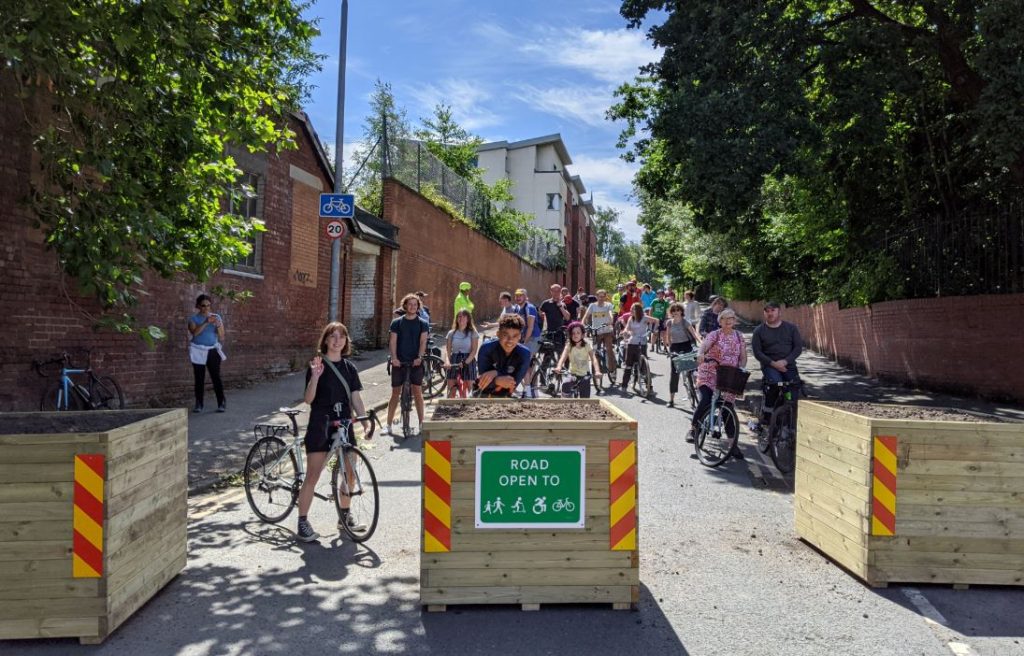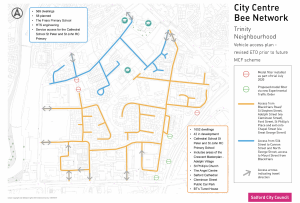
Campaigners have expressed their frustration at the council’s decision to remove bike filters on St Stephen Street in the Trinity area of Central Salford.
Salford Council, in conjunction with The Bee Network scheme, implemented a Low Traffic Neighbourhood (LTN) in the Trinity/Blackfriars area in 2020 to improve air quality and reduce traffic congestion.
This consisted of bike filters, large planters or concrete blocks that reduce car traffic and make neighbourhoods more accessible for bikes, pedestrians, children, the disabled and the elderly.
This decision was supported by 71% of the 459 residents in the Trinity/Blackfriars area who took part, according to a survey conducted by the Council in 2020.
The decision has since been repealed and the cycling filters on St Stephen Street have been removed. A council report indicated that councillors raised concerns about the scheme. It stated: “It was claimed that this measure cut the community in half, impeded residents more than through traffic.”
This is St Stephen Street in Salford
The first video is July 2020 when we had a Low Traffic Neighbourhood.
The second is yesterday when Salford let itself become a car park for Manchester. pic.twitter.com/hhh7CSiFWw
— Walk Ride Central Salford (@WRSalford) November 27, 2022
Richard Chitchley, an ex-Labour Councillor for Walken South said: “This is such a shame – the amount of time and effort that was put in to make this area safer and better for residents and pedestrians. Such a missed opportunity and a real step backwards for the city.”
Harry Gray, a representative of Walk Ride Central Salford, a community group that aims to encourage environmentally friendly travel in the city, said he was disappointed by the decision.
“Neighbourhoods have seen reduced through traffic. Apps like Waze and Google Maps have meant the amount of traffic on C-roads (non-main roads) has gone up considerably in the last ten years by taking people down residential streets.
“LTNs stop the traffic so that streets can be used by people cycling and walking, allowing them to live in a neighbourhood, rather than a road for people to drive through.”
“Every little change we make towards Net Zero is really important. LTNs are really cheap and easy to implement. Building public transport schemes and bike lanes are actually quite expensive.

Credit: Salford Council
In a statement to Salford Now, a spokesperson for the Council said:
“We are reviewing public feedback for and against this initiative and the scheme is on hold while that is done. We remain committed to doing all we can to support and encourage walking and cycling to ease congestion on our roads.”
Credit: Dan McNeice
A recent decision was also made by the Council to rethink the Blackfriars Street two-way cycle lane, a decision Harry Gray said was made without the consultation of the cycling community in Salford and Manchester.
“It feels like there has been a small minority of people who have complained about the scheme and [the council] have just listened to the nosiest of them rather than the silent majority who are in favour.
“The Department for Transport and Salford Councils have the data to back LTNs in terms of their popularity but there seems to be a few small businesses or locals who are kicking up a larger fuss with local councillors who tend to have a lot of sway in the area.”
According to Salford Council, a government survey conducted in late 2020 showed that the vast majority of respondents who reside in Low Traffic Neighbourhood (LTN) areas agreed that the Government should act to: increase road safety (90%); improve air quality (89%); reduce traffic congestion (89%) and reduce traffic noise (80%).















Recent Comments